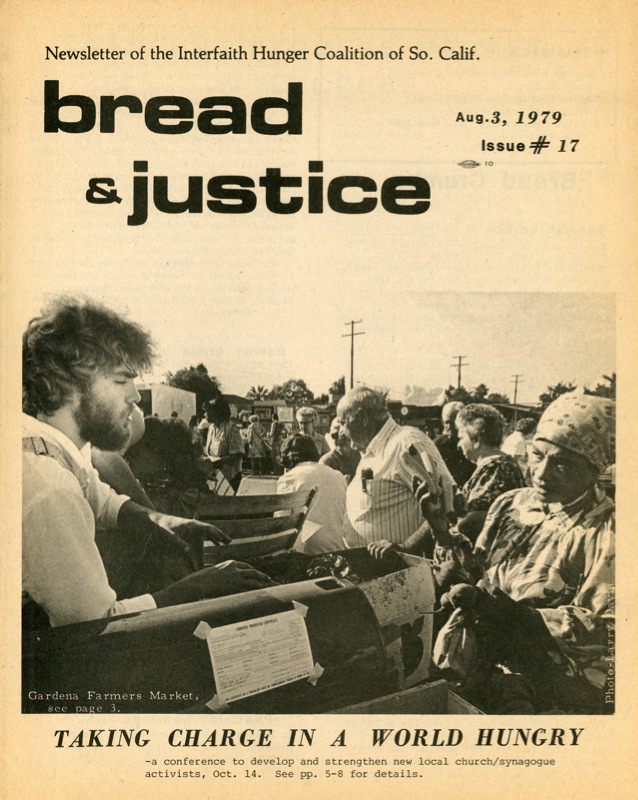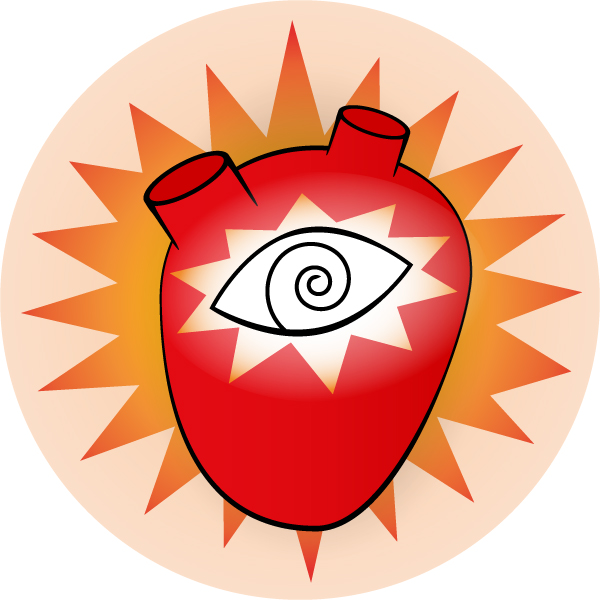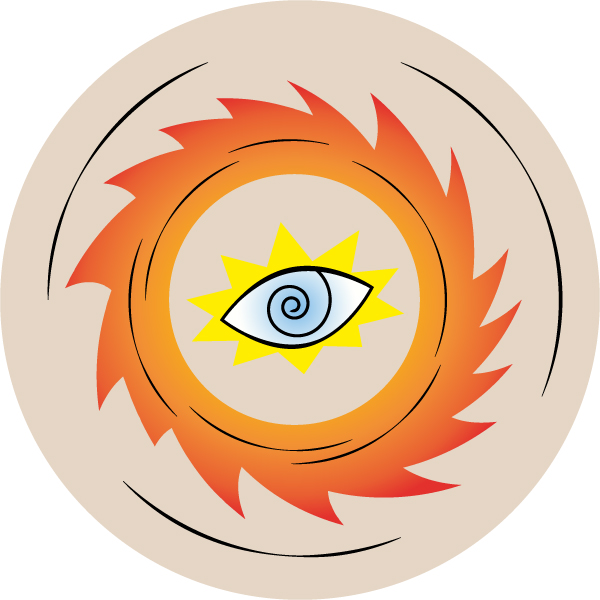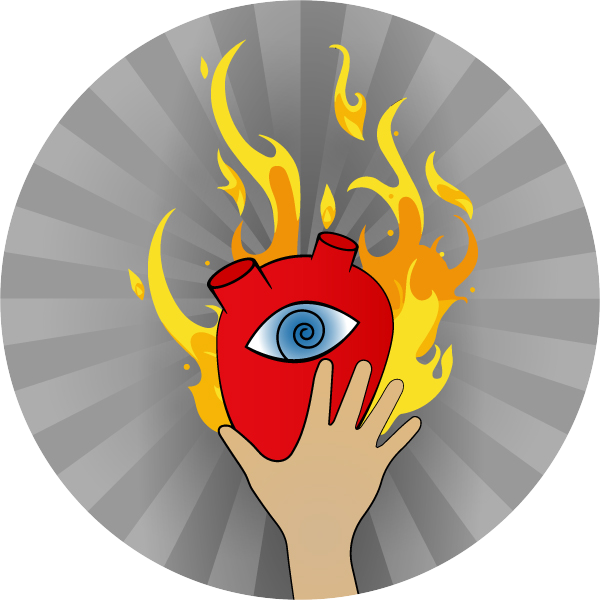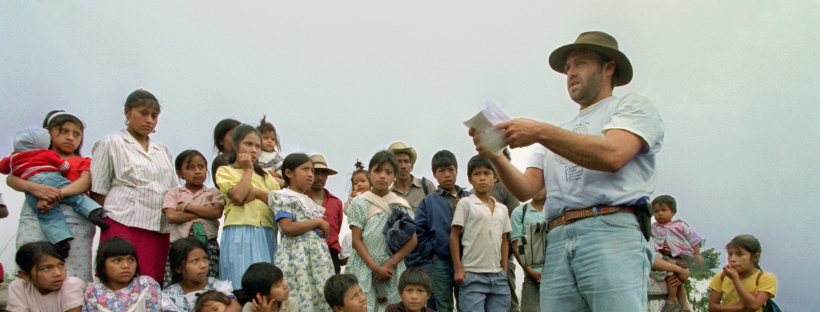

“It isn’t enough to simply protest, march, or occupy (albeit, worthy elements of social change themselves), systems change means digging in over the long haul to administer, to fix, and, in some cases, to disrupt and replace broken systems.”
-Wolfram Alderson, “Changing the Way America Eats” (USF)
Wolfram Alderson serving customers at the Gardena Farmers’ Market (1979) – the first Certified Farmers’ Market in California.
Located at 13000 South Van Ness at the corner of El Segundo and Van Ness in the Holly Park Church parking lot in Gardena, California, Saturdays, 8am – 1pm
(year-round).
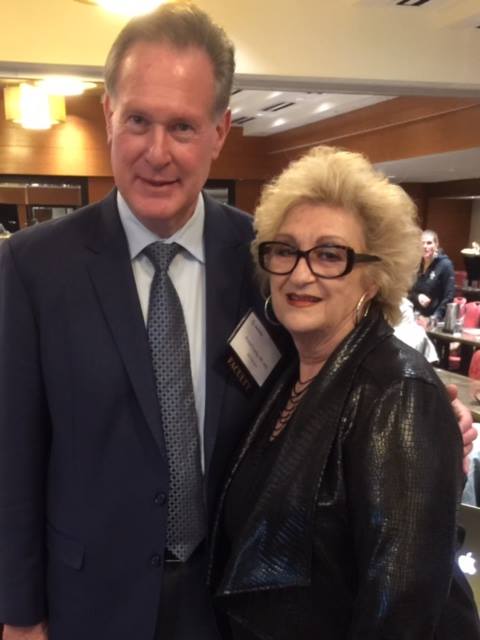
Dr. Robert Lustig and Roberta Ruggiero
Doctor and Patient Advocate –
Warriors for Metabolic Health
I produced this interview of Dr. Robert Lustig about his new book, Hacking the American Mind, and built his website: www.robertlustig.com.
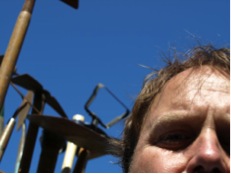
I want to reclaim this sense of love and respect and meaning with regard to the hoe. I believe that for man and woman alike, we can regain our dignity and bury the erosion of spirit that comes along with linguistic degradations of the word hoe. I see that dignity of the hoe is not merely found in the amazing breadth of functionality that it provides as a tool, nor is it solely contained in an ancient history of noble purpose, but in our common sense of being agents of fertility and creation, of being producers of food, of tilling the earth, of respecting the sacred, of becoming and serving as common implements designed for loving the earth and all of its inhabitants who happen to rely on a very thin layer of dirt called topsoil that feeds and sustains all life on the planet.
-Wolfram Alderson, Land Hoe! Personal reflections on the subject of returning dignity to hoes and men
You never change things by fighting the existing reality.
To change something, build a new model that makes the existing model obsolete.
-R. Buckminster Fuller
What does my social change work have to do with my art? In my case, I inherited both instincts from my mother, an amazing poet and activist. Some might consider art as a luxury, an activity for the elite, a hobby, unnecessary, a waste of time and resources, etc., when compared with the need to respond to the social and environmental challenges on our planet. In fact, art has been a powerful tool for sustaining my work as a lifelong agent for social change, and I have employed art as a amazing tool for healing and lifting up refugees, people with disabilities, abused children, and other populations whose voices are not adequately heard. As a cultural device, art helps humanity by imagining different pasts, presents, and futures when they were not otherwise visible, voicing dreams, concerns, injustices, and inspiring movements to foment, forge, sustain, and prevail. As an illustrative and storytelling mechanism, art invites us to step out of grim realities and to imagine brighter ones filled with love, beauty and transformation. Art and poetry are languages of the heart and soul.
“We don’t read and write poetry because it’s cute. We read and write poetry because we are members of the human race. And the human race is filled with passion. So medicine, law, business, engineering… these are noble pursuits and necessary to sustain life. But poetry, beauty, romance, love… these are what we stay alive for.”
― Walt Whitman, Leaves of Grass
For nearly four decades, I have labored in the social sector. You can read the (very) long version on my LinkedIn profile. The short version? While I have worked in many organizational settings serving diverse populations such as inner-city poor, refugees, homeless, seniors, abused children, indigenous women, mentally ill, people with physical and mental disabilities, etc., the common thread of my career is the focus on human and environmental health. The two are always connected – we simply can’t disconnect our health and well-being from the state of the environment we live in. Caring for our environment is essential to the body and soul, to our ecosystems and the soil. Connecting to the earth aligns our hearts and minds with what matters. Some of my friends, seeking just one word to sum up what I do, have referred to me as “The Gardener”. Cubans called me the “Human Tractor”. I embrace these monikers.
The health of the four spheres of our planet (Atmosphere, Biosphere, Hydrosphere and Geosphere) is fundamental to all life on our planet, and must be the number one priority of our species. There is no such thing as an “advanced species or intelligence” that does not recognize this as the greatest of all primary laws. To ignore such a law is not only ignorance, it is an attack on the planet, and every species that inhabits it. Awakening to this, understanding this, and acting on this as a global force is essential to a planet’s survival.”
– Wolfram Alderson, excerpt from Pupazzo Universo
The first ecosystem you may be familiar with is your very own metabolic system. My current focus on metabolic health and nutrition brings my lifetime of work full circle, much of which has involved changing the food system. I founded my career in field of food system change – organizing the first farmers’ markets in California. This is a movement that has grown to included over 8,000 community based farmers’ markets nationwide. However, our work is far from done: nearly 40 years later, we are in the midst of a global pandemic of metabolic disease that affects the majority of people on the planet. This is the result of trusting the food and healthcare industry with our metabolic health. Our metabolic systems have been hacked by the junk food business and ignored by a health care industry focused on treating disease – neither have much understanding of how important nutrition is to our well-being. Of course, we can’t leave out the profound ignorance that many of us have about our own metabolic systems, the importance of real food, and the impact of ultra-processed food on our bodies and on the planet.
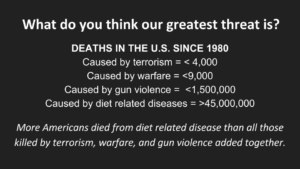
This is why I dedicate this culminating phase of my career to metabolic health and nutrition – education and advocacy. I’m convinced that if we can develop a clear sense of how our own metabolic systems work (through education), then we can also understand how our planetary ecosystems work. This systems thinking – systemic change – is what we need to transform our individual, collective, and planetary health. This means learning some science and letting go of some of the myths and fallacies we have literally and figuratively been fed for most of our lives. For example: malnutrition is not just about a lack of calories (or too many), it is also about eating the wrong calories. All calories are not the same. If you understand this, then you can begin to deconstruct the marketing mythology of the “energy balance” hypothesis. Systems change requires us to understand and address the systemic causes of the maladies that affect us and our planet – not just treat the symptoms.
“Body concentrates order. It continuously self-repairs. Every five days you get a new stomach lining. You get a new liver every two months. Your skin replaces itself every six weeks. Every year, 98 percent of the atoms of your body are replaced. This non-stop chemical replacement, metabolism, is a sure sign of life.”
–Lynn Margulis
The root causes of metabolic disease are fundamentally the same – poor nutrition. The metabolic system is essentially our cellular engine, making (and destroying) all cells in our body, and therefore affecting all of the systems of the human body. Hypoglycemia is on a long list of metabolic disorders that have a complex range of causes but are primarily food-related disorders. Hypoglycemia may be considered an early indicator of more advanced metabolic disease. ‘The hypoglycemia of today is the diabetes of tomorrow,’ states the HSF website. This phrasing might seem simplistic, but low (and high) blood sugar are an indication that something is seriously out of balance with the metabolic system (disruption in blood sugar metabolism caused primarily by diet).
This is why I continue my journey with Dr. Robert Lustig, serving as his Global Director of Education, and have accepted the calling to serve as CEO of the Hypoglycemia Support Foundation (HSF). I also have the amazing honor of working with Roberta Ruggiero, HSF Founder, to retain and build upon the reputation of HSF as a leading expert voice and advocate for people suffering from hypoglycemia. We acknowledge that hypoglycemia is just one disease that exists within a spectrum of metabolic disorders. Unfortunately, in the field of metabolic health, the key players are all in silos – despite the common denominator of diet and nutrition that underlies all these diseases – so we are forging a “metabolical” plan to serve as a unifying force in this fractured field.
During the time that you took to read this, at least five people have died from metabolic disease that could have been prevented through proper nutrition education and easy to implement lifestyle changes.
Please join with me and support the Hypoglycemia Support Foundation, and help us reverse an epidemic that is destroying our health and the economy at an frightening pace.
Lexicon
Four Spheres
The four spheres of our planet are Atmosphere, Biosphere, Hydrosphere and Geosphere.
Generality of the Metabolic Paradigm
Main Systems of the Human Body
Main Processes of Metabolism
Not a thing
“I live on Earth at present, and I don’t know what I am. I know that I am not a category. I am not a thing — a noun. I seem to be a verb, an evolutionary process – an integral function of the universe.”― R. Buckminster Fuller
